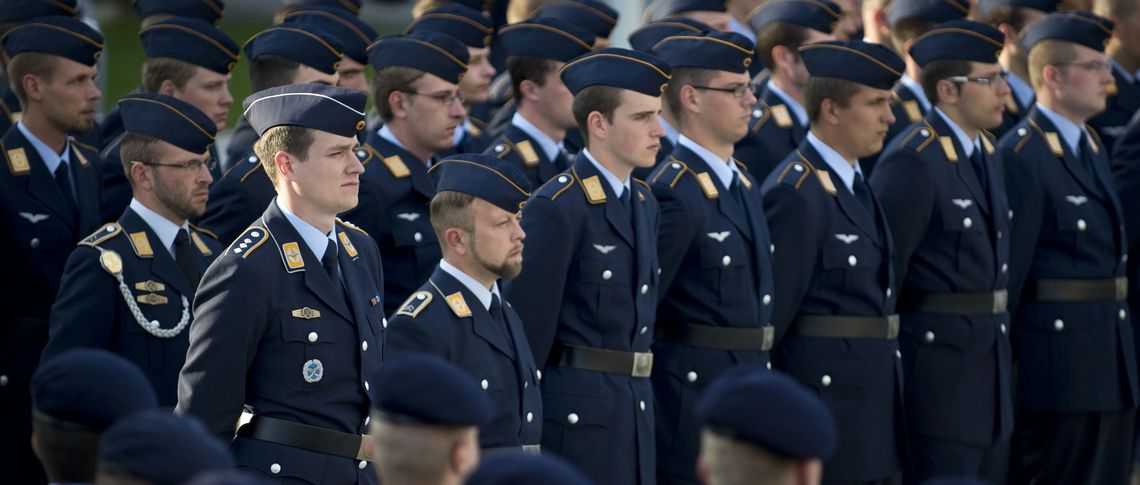Europe is undergoing a renewed phase of militarisation, with governments across the continent eyeing conscription as a solution to recruitment shortfalls. Today, Germany’s Bundestag (parliament) will debate a proposal that could fundamentally reshape the nation’s defence posture. The plan for renewed military service has already sparked fierce debate, with Bavaria’s Minister-President Markus Söder drawing a line in the sand: ‘There’s no way around compulsory military service. Half-measures are no longer enough. A wishy-washy conscription helps no one.’ Thirteen years after suspending mandatory military service.
The federal government’s official communication states that ‘the new military service should initially be voluntary.’ It is the word ‘initially’ that suggests a policy trajectory with far-reaching consequences for the country’s young people. Should voluntary recruitment fail to meet Defence Minister Boris Pistorius’ targets and the NATO commitments of 260 000 active soldiers as well as 200 000 reserves, Germany is likely to reintroduce compulsory service. This potential policy reversal represents more than a military adjustment — it signals a shift in how the state relates to its youth, and how it conceptualises citizenship and obligation. But the case against conscription is overwhelming. It makes no economic sense, undermines democratic principles and betrays the generation being asked to serve, who are already struggling under the weight of crises not of their making.
Following this debate, Germany is not an outlier: The Bundeswehr (armed forces)’s recruitment crisis reflects broader European trends. Nine EU member states currently maintain conscription (Austria, Cyprus, Denmark, Estonia, Finland, Greece, Latvia, Lithuania and Sweden), while others like Croatia plan to reintroduce it by 2026. Poland aims for 100 000 conscripts annually. Latvia reactivated conscription in 2023, initially on a voluntary basis, becoming mandatory in 2024 (foreshadowing for Germany?).
Producing better citizens
Proponents of conscription often invoke a familiar narrative: military service builds character. According to this view, time in uniform instils discipline, resilience and civic responsibility in young people. It’s a compelling story, rooted in traditions that stretch back generations. But what does ‘character development’ actually mean in this context? Advocates point to qualities like self-discipline, physical fitness, the ability to follow orders and a sense of collective purpose. The implicit promise is straightforward: conscription doesn’t just produce soldiers, it produces better citizens. But this narrative requires far more scrutiny.
Before romanticising military service as formative, we must examine its consequences. Austria, which maintains conscription, offers a troubling case. In 2017, a conscript died of overheating during a forced march. In 2019, a military recruit committed suicide in the barracks. In 2024, another conscript died after being shot by a fellow soldier. Incidents like these raise serious questions about the safety and institutional culture of conscript-based armed forces.
Conscription of an entire age cohort would reduce Germany’s economic output by 1.6 per cent, amounting to approximately €70 billion annually.
Research consistently contradicts the character-building narrative. A study in Argentina found that men who served became more politically conservative, more authoritarian, less tolerant and more likely to support military interventions and coups. Spanish research demonstrates that military personnel are significantly more likely to support far-right parties, with communities near military bases showing higher extremist support due to the military’s emphasis on authoritarian and nationalist values. The common thread in these findings is the reproduction of hierarchical, nationalistic and exclusionary values within military settings.
If the objective is to cultivate solidarity, empathy and civic responsibility among young people, there are more effective avenues. These values are more readily developed through education, community engagement and participatory democratic processes than through military discipline and command structures. Some advocate for alternative civilian service in healthcare, social work or community development as a compromise. While this proposal has merit, the complexities of designing fair, voluntary and adequately compensated civic programs extend beyond this article’s scope. What remains clear is that any service model must avoid becoming another obligation imposed on young people without addressing their actual needs.
The push for conscription comes at a particularly challenging time for young Europeans. According to the European Parliament’s Winter 2025 Survey, 33 per cent of Europeans expect their standard of living to decrease over the next five years. When asked what the European Parliament should prioritise, citizens overwhelmingly point to inflation, rising prices and cost of living as well as the fight against poverty and social exclusion. The concerns of young people are even more pronounced. The Builders of Progress study, conducted by the Foundation for European Progressive Studies (FEPS), identifies employment, poverty and inequality as the most urgent issues among youth. Following the Covid-19 pandemic, this generation is grappling with disruptions to education, limited job prospects, mental health challenges, rising housing costs and student debt.
Framing issues like climate change, migration, resource scarcity and geopolitical conflicts through a security lens justifies military buildup while diverting resources from diplomatic negotiation, conflict resolution, international development and preventative measures.
Rather than addressing these fundamental challenges, political leaders propose disrupting young people’s careers and education for military service — a response that appears both inadequate and economically counterproductive. Research from the German ifo Institute reveals that full conscription of an entire age cohort would reduce Germany’s economic output by 1.6 per cent, amounting to approximately €70 billion annually. Even conscripting just a quarter of each age group would cost €3.2 billion in state expenditure and €17.1 billion in economic costs annually. According to ifo researcher Panu Poutvaara, increasing volunteer recruitment through improved salaries would be significantly more cost-effective than returning to compulsory service.
Europe is already experiencing labour shortages in critical sectors such as healthcare, education, technology and the green economy. Redirecting young people away from these fields and into military institutions undermines efforts to build a more sustainable and resilient European economy. Investment in education, training and employment would be a far more productive allocation of public resources because it equips young people with the skills and stability needed to contribute to the economy long-term, while directly addressing the economic insecurity and limited opportunities they identify as their most pressing concerns. The institute’s analysis demonstrates that forced military service delays young people’s workforce entry, preventing them from building human capital and wealth during crucial developmental years.
The conscription debate also reveals a troubling pattern in contemporary European politics: consistently placing responsibility for societal challenges on younger generations. Whether addressing defence shortfalls, climate change or demographic transitions, political decision-makers increasingly turn to youth obligations rather than structural solutions. This approach treats young people as ‘moral subjects’ – bearers of responsibility and duty – while denying them full political participation. They face expectations to serve while having limited influence over whether that service is necessary or how it should be structured. This creates a democratic deficit where those most affected by policies have the least influence over them.
Moreover, the militarisation trend extends beyond conscription. For instance, the EU’s December 2020 ‘Roadmap on Climate and Defence’ explicitly prepares Europe for ‘future climate wars’, framing environmental challenges through a security lens. This militarised response to complex global problems is dangerous because it forecloses diplomatic, cooperative and preventative approaches. Framing issues like climate change, migration, resource scarcity and geopolitical conflicts through a security lens justifies military buildup while diverting resources from diplomatic negotiation, conflict resolution, international development and preventative measures. It turns challenges that require collective action into threats that demand defensive posturing, creating cycles of escalation rather than pathways to resolution.
NATO’s commitment to allocate five per cent of GDP to defence by 2035 will require massive resource reallocation away from education, healthcare and social services — precisely the areas young Europeans identify as priorities.
European governments would do well to recall the spirit of Article 11 of the Italian Constitution, which declares that the Republic ‘repudiates war as an instrument of aggression against the freedom of other peoples and as a means for settling international disputes.’
The revival of conscription represents a failure of political imagination and democratic governance. As Italian Defence Minister Crosetto said: ‘armed forces cannot be thought of as a place to educate young people’. Rather than forcing young people into military service, European governments should address the root causes of recruitment difficulties: inadequate compensation, poor working conditions and limited career prospects within military institutions. As philosopher Jürgen Habermas notes, the abolition of conscription reflected ‘a world-historical learning process’ — the recognition that militarised approaches to conflict resolution are fundamentally problematic. Reversing this hard-won insight disregards the lessons of past wars and the sacrifices made by previous generations, reducing their legacy to staffing solution.
Young Europeans deserve policies that prioritise their education, economic stability and meaningful participation in democratic life — not compulsory service in institutions that risk undermining the very values they are meant to protect. European governments would do well to recall the spirit of Article 11 of the Italian Constitution, which declares that the Republic ‘repudiates war as an instrument of aggression against the freedom of other peoples and as a means for settling international disputes.’ This post-war commitment to peace, diplomacy and restraint is not merely historical. It remains central to the European project. In an age of global uncertainty, it is this legacy, not a renewed focus on militarisation, that should guide Europe’s path forward.






